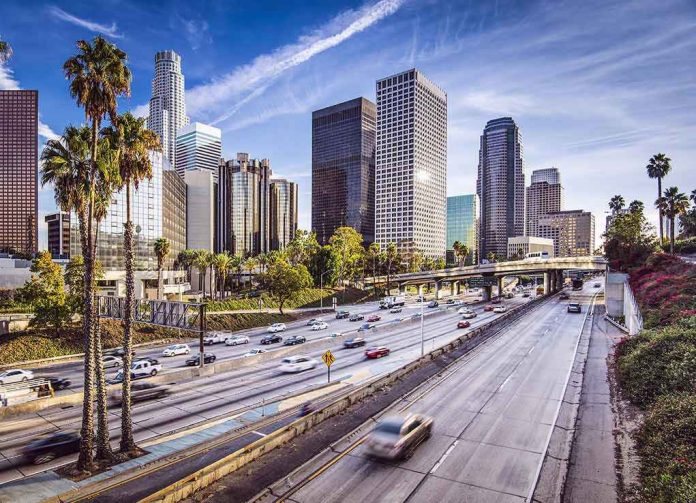
The Supreme Court’s stunning reversal of a Biden-era court order has handed President Trump a decisive victory, allowing aggressive immigration raids to resume in Los Angeles and igniting fierce debate over constitutional rights and federal power.
Story Highlights
- The Supreme Court lifted restrictions on Trump’s immigration raids, allowing immediate enforcement in Los Angeles.
- Liberal justices and civil rights groups warn the decision could erode Fourth Amendment protections and legitimize racial profiling.
- The unsigned order offers no written legal rationale, fueling criticism from transparency advocates.
- The ruling marks a high-profile win for Trump’s immigration agenda, while legal challenges continue in lower courts.
Supreme Court Empowers Trump Administration to Resume Immigration Raids
On September 8, 2025, the U.S. Supreme Court granted the Trump administration’s emergency request to stay a federal district court’s restraining order, previously imposed by a Biden-appointed judge. This action immediately restored the Department of Homeland Security’s authority to conduct broad immigration raids across Los Angeles and surrounding counties. The Court’s decision came without a signed opinion or detailed legal reasoning, a move that has drawn scrutiny from both sides of the aisle.
For conservative Americans frustrated with years of lax enforcement and open-border policies, the high court’s green light is seen as a long-overdue restoration of federal immigration authority. The Trump administration has consistently argued that strong enforcement is necessary to uphold the rule of law, protect American communities, and deter illegal entry. By lifting the lower court’s restrictions, federal agents are once again able to act decisively, targeting locations such as car washes, farms, and public parks where illegal activity has been suspected.
Liberal Dissent and Civil Liberties Concerns Escalate
The Supreme Court’s unsigned order overturned lower court findings that recent DHS raids likely violated the Fourth Amendment, particularly protections against unreasonable searches and seizures. Liberal justices—including Sotomayor, Kagan, and Jackson—issued a pointed dissent, warning that the ruling could legitimize racial profiling and place innocent citizens and legal residents at risk of wrongful detention. Civil rights groups, such as the ACLU, have condemned the decision, arguing it sets a dangerous precedent by allowing federal authorities to make stops based on race, language, location, or occupation—factors they say undermine constitutional guarantees.
Despite these concerns, Justice Brett Kavanaugh’s concurrence noted that while ethnicity can be a “relevant factor” in certain law enforcement stops, there remains a risk of collateral damage, including the detention of U.S. citizens. The lack of a detailed legal rationale from the Court’s majority has intensified calls for greater transparency and accountability, highlighting the ideological divisions shaping today’s immigration debate.
Local Pushback and the Role of Sanctuary Policies
Los Angeles, known for its large immigrant population and vocal resistance to federal immigration crackdowns, has become ground zero for the renewed enforcement effort. Local officials have historically opposed federal raids, citing fears of community disruption and mistrust in law enforcement. The Trump administration’s renewed push underscores the ongoing power struggle between states, cities, and the federal government over immigration policy. As DHS and ICE agents resume operations, local leaders warn of increased unrest and economic disruption, especially in industries reliant on immigrant labor.
Public protests have erupted in response to the raids, with critics warning of long-term damage to community trust and civil liberties. While legal proceedings continue—with a district court hearing on a preliminary injunction scheduled for September 24—the Supreme Court’s decision stands as a pivotal moment in the nation’s ongoing immigration battle.
Broader Implications for Constitutional Rights and Federal Power
The Court’s ruling signals a broader shift in the balance between federal enforcement and individual rights. Supporters argue that restoring robust immigration enforcement is essential to protect American sovereignty and uphold the Constitution in the face of years of globalist, open-border policies. Opponents warn that this decision could erode fundamental Fourth Amendment protections, opening the door to racial profiling and government overreach. Legal experts caution that, by issuing an unsigned order without a detailed opinion, the Supreme Court has left critical questions unanswered, raising the stakes for future legal battles over immigration and civil liberties.
Supreme Court Grants Trump Admin's Emergency Request, Lifts Biden Judge's Limits on ICE Patrols in LA via @WestJournalism https://t.co/lU2ziPKzOS
— meme (@mmemmepoppins) September 9, 2025
As President Trump’s administration presses ahead with its agenda, the nation faces renewed debate over the limits of federal power, the core of constitutional protections, and the future of immigration enforcement. The next round of hearings will test whether local and civil rights advocates can mount a successful challenge—or if the administration’s approach will become the new norm for years to come.
Sources:
U.S. Supreme Court Grants Stay in LA Raids Case – ACLU of Southern California
Supreme Court Order and Dissenting Opinions: LA Immigration Raids


